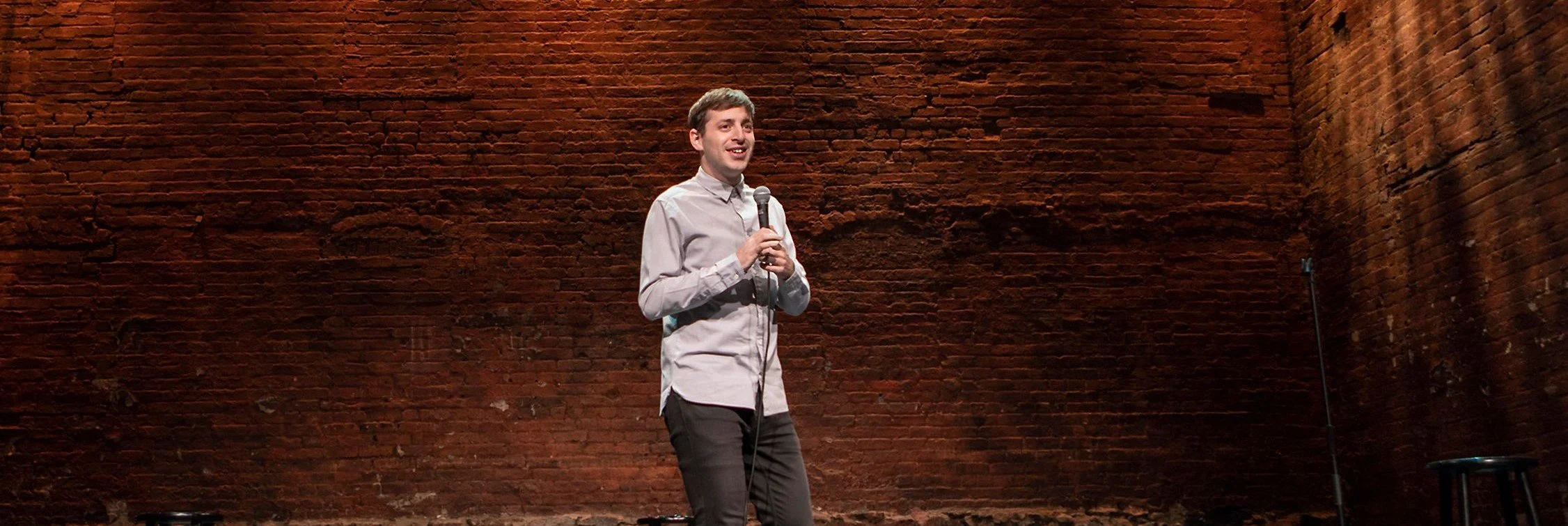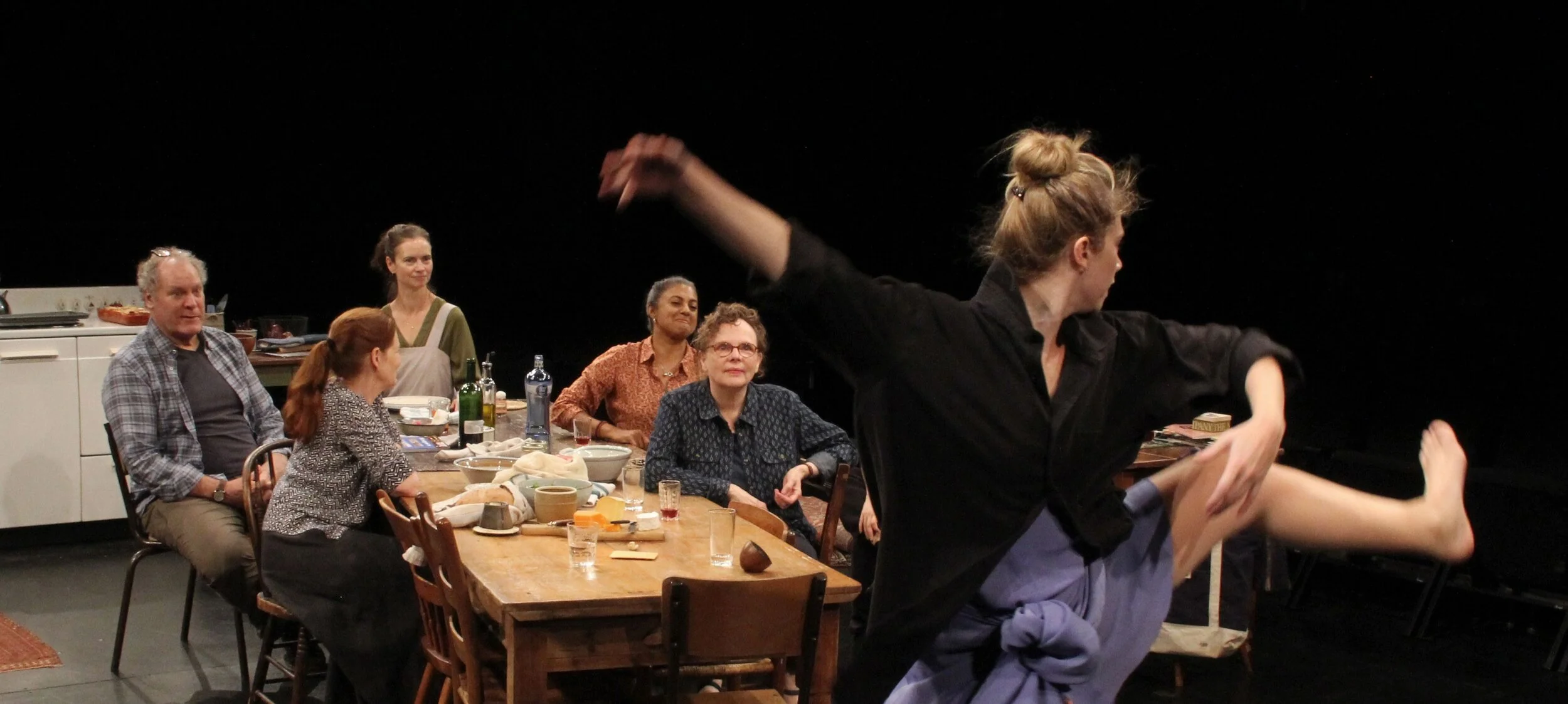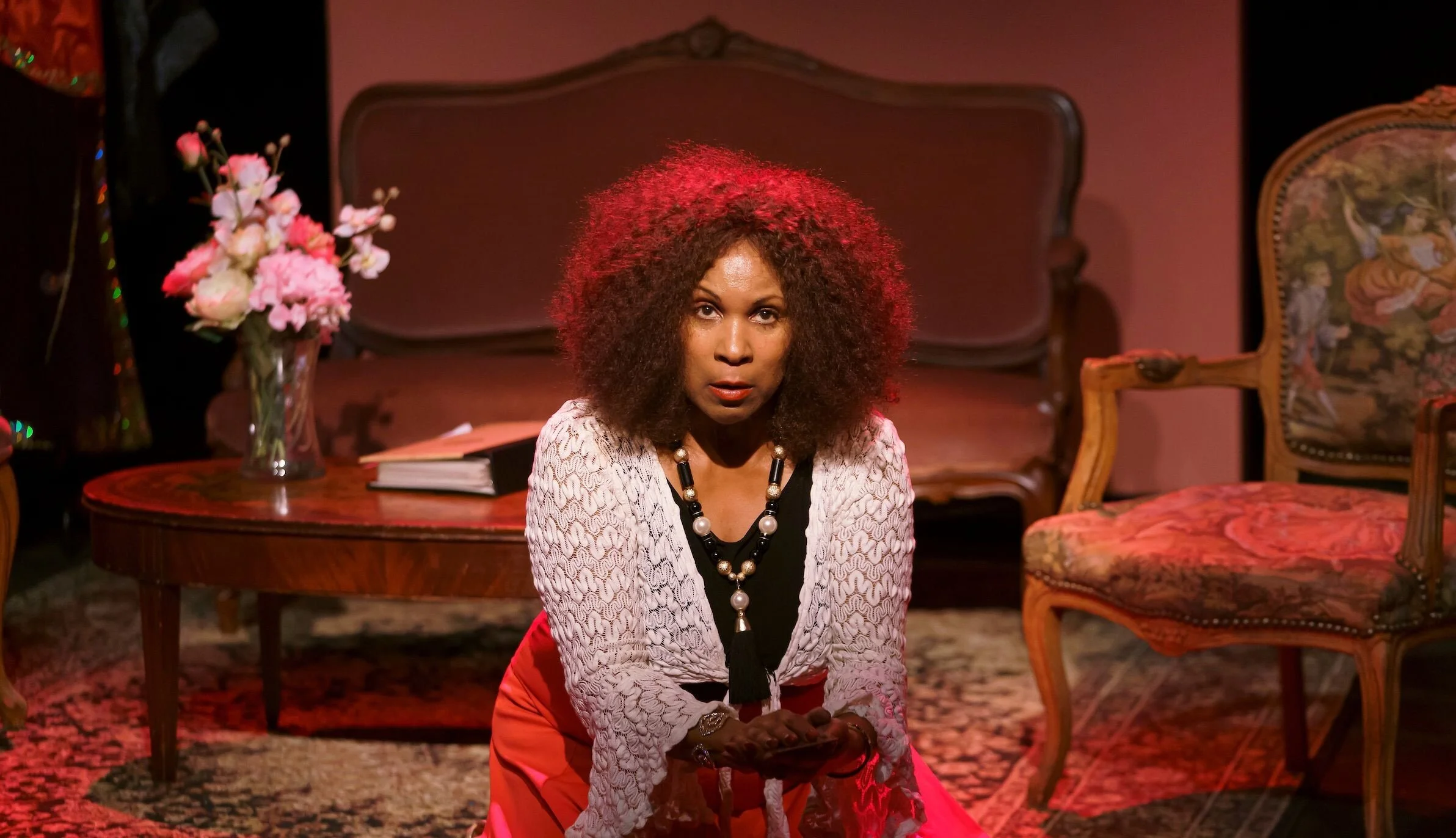This Space Between Us contains the opposite of an 11 o’clock number. The nonmusical scene late in the play is a showstopper all right, though not in the rousing good sense. Rather, all action and dialogue literally stop while two characters stand over an air mattress as it inflates. It lasts ... well, however long it takes an air mattress to inflate, which may only be about a minute but seems a lot longer, since the audience has to sit there and wait out this unnecessary moment in a show that has already worn out its welcome.
Sandblasted
Before the play Sandblasted even begins, it grabs the audience’s attention: They enter the theater to see a stage covered with sand—lots and lots of sand. Curiously, this sandy location appears to be indoors, as the set also includes a window on one side of the stage and doors on the other two. The play itself, however, may not stir the audience’s attention or curiosity—at least not for the full hour and 40 minutes (without intermission) of its running time. While Sandblasted features impassioned performances and some lovely two-person scenes, it tends toward the talky and abstruse.
Prayer for the French Republic
Issues of Jewish identity, religion, heritage and oppression are given a fresh spin in Joshua Harmon’s Prayer for the French Republic, a work of considerable length and intellectual heft. Harmon has set his drama in France, America’s oldest ally, which shares its values. Although it is a country closer geographically and emotionally to the harrowing experience inflicted on Jews by World War II and the Holocaust, it stands in for the United States as well. Incidents of anti-Semitism have increased in both countries in the last decade.
The Daughter-in-Law
D. H. Lawrence wrote The Daughter-in-Law in 1912–13, at the age of 27, around the same time as his novel Sons and Lovers. The play’s first production came posthumously, in 1967. There have been very few productions since, one of which was by the Mint Theater Company, in 2003, fulfilling its mission to “find and produce worthwhile plays from the past that have been lost or forgotten.” Now Martin Platt, who directed that production, again takes the reins for the company’s revival of The Daughter-in-Law, currently playing at City Center Stage II.
The Merchant of Venice
When most people think of Shakespeare’s The Merchant of Venice, it's Shylock who springs to mind, not the titular merchant. As a Jew in a Christian city-state, Shylock is an outsider; as a moneylender in an economy that reviles usury, he’s a pariah. Director Arin Arbus has chosen John Douglas Thompson, one of the most accomplished classical actors of his generation, as Shylock in her modern-dress production at Theatre for a New Audience (TFANA). Thompson, reportedly the first Black actor to play Shylock professionally in New York, finds music even in the most acidic passages of the Bard’s rhetoric; his nuanced performance explodes at crucial points, with moral indignation outstripping self-pity.
Wolf Play
There have been plays affirming LGBTQ people’s fitness as parents. There have been plays where child characters are played by puppets, and stories in which a child who feels different identifies as some type of animal. Boxing has been used as a metaphor, and there have been productions with lots of props and scenery that are upended by the final scene—one that comes to mind, Blasted, was staged at Soho Rep, whose new show, Wolf Play, includes all these things.
Just for Us
Despite Alex Edelman’s opening caveat that “my comedy barely works if you’re not a Jew from the Upper East Side,” he is one of the rare, masterful stand-up comics who can “cast out” and then successfully “reel back in” a diverse audience. He can take his monologue way off-topic, on a tangent that itself could be a stand-alone show. Although the thrust of Just for Us is his attendance at a white-supremacist gathering, along the way he signs and mimics the distress of a gorilla at Robin Williams’s death (the gorilla really grieved), then quips that Brexit should be called “The Great British Break-Off,” and lovingly, yet mercilessly, spears his family, their Hebrew names, his brother’s Winter Olympics prowess as part of the Israeli skeleton team, and his Orthodox Jewish parents’ finessing of Christmas (including a decorated tree in the garage) to comfort a bereaved Christian friend.
Selling Kabul
Selling Kabul, Sylvia Khoury’s play currently running at Playwrights Horizons, is significant and timely. Although written in 2015, the drama’s focus on the collateral damage of the pullout of U.S. forces in Afghanistan is even more urgent in light of President Biden’s complete withdrawal three months ago. Significant, timely, and urgent do not, however, necessarily make for great theater. To its credit, Selling Kabul does not minimize the political and ideological concerns, but it offers an impressively riveting, suspenseful, and deeply moving portrayal of four complex individuals caught up in the sweep of national turmoil.
The Lanford Wilson Project: “The Mound Builders” and “Sympathetic Magic”
Lanford Wilson’s 1975 play The Mound Builders centers on an archaeological excavation in Illinois of a pre-Columbian civilization, a conceit rich in metaphor and suggestion, and expressed in often-lyrical language. (The mounds in question refer to the earthworks constructed by the early inhabitants of the area.) The historical reach and resonance of the concept is combined with the claustrophobia of domestic dysfunction: the play was described in the New York Times review of the original Circle Repertory Company production as “an epic in the guise of a family drama.”
Cullud Wattah
Water is an essential part of life. It helps maintain bodily function and provides nutrients and sustenance for plants and animals. It seems unfathomable that life can exist without water, yet that is the reality for the citizens of Flint, Mich. Erika Dickerson-Despenza’s new play, Cullud Wattah, addresses the pollution of the city’s water system and how it has affected the citizens. Cullud Wattah also focuses on the disparity and inequities that prevail in cities with a majority population of minorities.
Morning Sun
Morning Sun by Simon Stephens is a multigenerational play about a mother, daughter, and granddaughter. Most of their story, both set in and serving as an homage to New York City, has been told before: mother-daughter conflicts, failed love affairs, and childhood friendships that don’t stand the test of time. Stephens has crafted fast-paced, staccato dialogue that moves effortlessly through decades to tell their story.
Morning’s at Seven
Paul Osborn’s play Morning’s At Seven is one of theater’s great rescues. A flop on Broadway in 1939, it was resurrected in 1980 by director Vivian Matalon, whose peerless production established it as a classic piece of Americana. It’s a gentle satire on small-town life, with busybodies and petty jealousies and snobbery, and although it’s as sturdily constructed as a Chekhov play, it’s not as dark. There may be conflicts, but the characters have more fun—and are fun to be around.
Autumn Royal
There’s a moment early in Kevin Barry’s darkly comic Autumn Royal, currently running at the Irish Rep under the direction of Ciarán O’Reilly, when siblings May (Maeve Higgins) and Timmy (John Keating), both in their 30s in Cork city, Ireland, realize that the current predicament of caring for their psychotic, decrepit, slowly dying father might have no end in sight.
Brecht on Brecht
German poet and playwright Bertolt Brecht (1898-1956) was a world traveler—not by choice, but by conviction. His larger-than-life, highly controversial career caused him to flee Nazism and take refuge in several countries before he was granted permission to settle in the United States. The Theater Breaking Through Barriers (TBTB) production of Brecht on Brecht tracks the playwright’s odyssey using his songs and writings, which include The Threepenny Opera, The Life of Galileo, and Mother Courage and Her Children.
Chasing Jack
Chasing Jack, by John S. Anastasi, is the story of a man willing to lose it all for the thrill of throwing the die. Dr. Jack Chase (played with boundless energy by Emanuele Secci) is a tireless cardiac surgeon who appears selfless but has one too many skeletons in the closet. The biggest one—a gambling addiction—can no longer remain hidden, and, after losing a patient, he finds himself in court.
Sanctuary City
The programs handed out at Martyna Majok’s Sanctuary City, produced by New York Theatre Workshop and presented at the Lucille Lortel Theatre, note that they have been “frozen in time”: they were printed for the play’s original run, which began in March 2020, and are now accompanied by a QR code providing updated information. This new information includes a remount director, Caitlin Sullivan, in addition to the original direction by Rebecca Frecknall.
What Happened?: The Michaels Abroad
It finally dawned on me that theater was back in New York City when I was once again in the presence of characters in a Richard Nelson play as they sliced bread, grated cheese, sipped wine, and had conversations that made you feel like an eavesdropper more than an audience member.
Charmed Life: From Soul Singing to Opera Star
Many an autobiographical solo show has been born from hardship— growing up closeted, say, or having an intolerable job, or living through a war. Lori Brown Mirabal’s jumping-off point is the complete opposite. It’s right there in her show’s title, Charmed Life: From Soul Singing to Opera Star.
Fruma-Sarah (Waiting in the Wings)
In Fruma-Sarah (Waiting in the Wings), the multitalented Jackie Hoffman portrays Ariana Russo, a barely talented amateur actor who is literally and figuratively at the end of her rope. Stuck in the minor role of the ghostly and ghastly Fruma-Sarah, in a community theater staging of Fiddler on the Roof in Roselle Park, N.J., she must spend the first “hour and seven minutes” of the show offstage, strapped in her flying harness and waiting for her cue to soar.
Voyeur: The Windows of Toulouse-Lautrec
Voyeur: The Windows of Toulouse-Lautrec explores the life of Henri de Toulouse-Lautrec, the immensely talented 19th-century French painter and printmaker, using the sidewalks, doorways, and windows of Greenwich Village as the setting for a “pandemic-friendly theatrical experience.” Live performance, puppetry, music and a short black-and-white film combine to help the site-specific production tell the story of the artist who captured the seamier side of the Belle Époque.
























